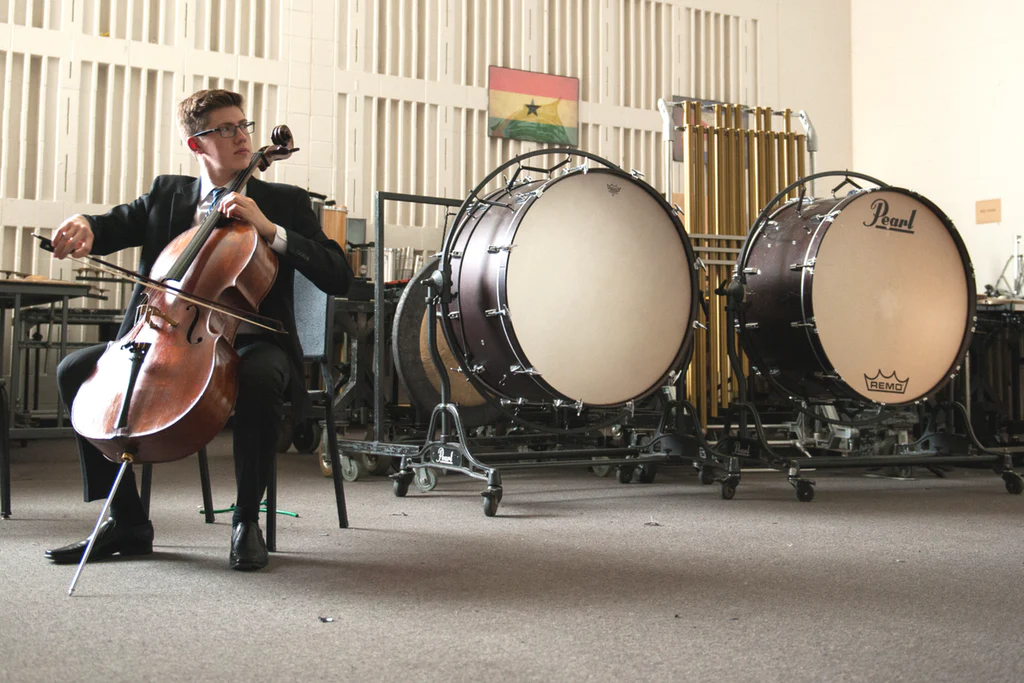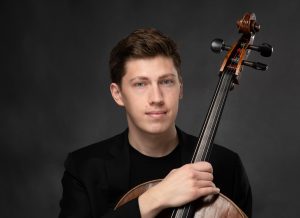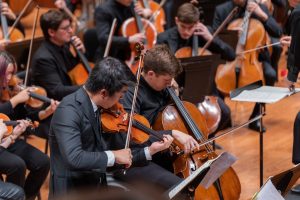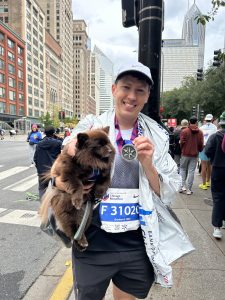
Austin Huntington – Courtesy of Esther Boston. Used with permission.
In an attempt to put a face on the Indianapolis Symphony Orchestra, the organization features photos and brief bios of members on banners located in the Hilbert Circle Theatre lobby. The musicians are also spotlighted in video profiles that are projected onstage above the orchestra prior to concerts. Among those highlighted in its effort to connect ISO musicians to the community, is cellist extraordinaire Austin Huntington.
Huntington was appointed principal cellist of the Indianapolis Symphony Orchestra in 2015 at the age of 20, currently making him one of the youngest principal musicians in a major American orchestra. He holds a Bachelor of Music degree from the Colburn School Conservatory of Music and a Master of Music degree from Indiana University, where he studied with Ronald Leonard and Eric Kim respectively.
Huntington was recently the runner-up for the San Francisco Symphony’s principal cello position in March 2022 as well as a finalist for the Boston Symphony Orchestra’s principal cello position in March 2018. He has been featured as guest principal cello with the San Francisco, Symphony, Utah Symphony, and Florida Orchestra. During the summer, Austin serves as principal cellist for the Mainly Mozart Festival and Colorado Music Festival orchestras. He plays on an Italian cello made in Florence, c. 1740.
Succumbing to the ISO’s effective promotion of its players and as a fan of the cello instrument and Huntington himself, I reached out to the affable artist in a quest to learn more about him. A few weeks ago, he and I sat down at Needler’s Coffee Shop, in downtown’s Lockerbie neighborhood, for an interview. Below is an edited transcript of our conversation.

Austin Huntington – Courtesy of Josh Humble. Used with permission.
When did you begin playing the cello?
I was four and am now 29 — long enough to know what I am doing but not long enough to have any disenchantment.
Why the cello?
My older brother started violin when he was four. He is 19 months older me. When your older brother plays an instrument, you want to play a better instrument so you can one up him. Our parents were not musical people, but they instilled a love of classical music early on. They took us with them to concerts in Battle Creek and Grand Rapids in Michigan where we lived at the time. My brother and I did Kindermusik to learn rhythm. I was horrible at practicing. There are times I am still horrible at practicing.
My late grandmother used to love to tell the story of how, while visiting them, I would get up at six a.m. and set up my cello in my room and go back to sleep. Then I would get up before they did at six and would tell him that I had practiced for an hour and then asked to watch TV. They called my parents and told them to get him into classes or I was never going to make it as a cellist, because I never practiced. Fast forward —my grandparents flew in for the Beethoven 9th, when I made my ISO debut. We went to St. Elmo Steakhouse for dinner afterwards to celebrate, and my grandfather said, “Do you know who this person is?” to all the servers as I discreetly tried to leave.
After moving from Michigan where did your family live?
We moved to South Bend from Michigan when I was seven or eight, around 2004, so that we could be closer to Chicago for my brother and I to take lessons. It was also close enough for my dad to commute to work, so I lived there from elementary school all the way through high school. Going to high school in Indiana opened many doors musically, especially related to concerto competitions. It has come full circle recently as several of my private students are entering the same competitions that I did 15 years ago.
Tell me more about your family.
My dad, Tom Huntington, is an ER Doctor and my mom Cheri is a retired registered nurse. My older brother is Thomas. He is in his second year of med school at IU downtown, and my younger brother is Christian, and he is in his final year of med school, also at IU downtown.
Tell me about early years as a musician.
I went to Suzuki, which emphasizes the three-legged stool method involving the student, teacher and parents. You must be your own police officer and your own judge when it comes to practicing. It’s very easy to rely on two other sources to let a lot of things go and go the easy route. Later I studied with this great teacher at Northwestern for six to eight months and was planning on going further but he sat down with my mom and me and told them that I needed to start practicing.
At the time, I was ten. I thought I was doing fine but I got a recommendation to work with a symphony musician and began working hard for the first time in my life, I saw how successful he and accomplished he was. I never had a strong technical background. I was really into arias such as those in Wagner’s The Ring Cycle” and “Tristan and Isolde” and those of Verde and Puccini. I fell in love with music through arias. I loved playing them but did not have the technique to support it. My teacher was not necessarily focused on technique, but his approach was teaching me how make the best and most true music possible without having to worry about hitting notes. He taught me how to focus on my foundation to support my music. Up to that point, I had relied on parents and teachers so when I had a teacher, whom I wanted to emulate, it changed everything. His name is Ronald Leonard, principal cellist of the LA Symphony for 25 years, now retired, and one of the classiest cellists I know.
What do you love about music and playing it?
I love that no matter what differentiates us in life, whether it is language, religion, politics, age, or anything else, music can speak to everyone universally. Music is, indeed, a universal language that acts as a balm for modern society in which we constantly feel divided or separated from one another. Music has the opposite effect, bringing people together for a shared experience.

Austin Huntington – Courtesy of Tom Russo. Used with permission.
Any music influences?
Frank Sinatra. A teacher I studied with at the age the age of 14, for six weeks in the summer, had me listen to Frank Sinatra’s greatest hits, so I could hear his innovation and the phrasing which were impeccable. Although he was a vocalist rather than a cellist, he taught me how to be big but also beautiful, with cleanliness and purity.
What makes the cello unique as an instrument?
The cello mimics the human voice. I find it true for at my voice at least. It’s more of a baritone or a bass so it mimics the human voice. It’s a sound that has warmth and resonance and is deep and rich. There are pieces for the cello that give off the same feelings as experiences like coming home from Thanksgiving —a kind of warm feeling of happiness— being around family and friends and the joy that comes from that. It can also convey ethereal moments, go lower and do the more grounded.
What is your take on contemporary classical music?
I love Steve Hackman to death not only because his music brings in audiences, but he also exposes us to artists such as rapper Hendrick Lamar, who would normally not be on anywhere on our radar. There may be those who disagree, but I feel Lamar is just as good as Stravinsky. He won a Pulitzer Prize and caused shockwaves like Stravinsky did with “The Rite of Spring.”
Any thoughts about cellist Stejpan Hauser who us now a TikTok star?
Two Cellos which he used to part of, brought pop music into classical music. Some Pops subscribers gave me a Two Cellos t-shirt after they went to one of their concerts. They became enthusiastic about cello and started coming to classical concerts. Times are changing at the ISO as well.
Is purism becoming less and less common in the world of classical music?
It depends largely on the market. There are always going to be pieces that people will want to see. The pieces that will draw people in. You can’t replicate everything. Even if you try to become purists. There isn’t necessarily a reason why there has to be one way or another. You can have a period performance of a Beethoven Symphony but there is also a time and a place for us to play new artists. I personally love playing movies. Those concerts help audiences realize how scores go with movies, provide foreshadow and advance the story. Movies are like modern versions of operas.
Why do classical musicians look so serous while they are playing?
Slipped Disc is website and like People magazine for classical music. It stirs up a lot of drama in its “Dear Alma” column. There was a question which read “Why are musicians always so serious and look like they are not having fun?” Someone gave a snarky reply that “You try playing the flute while smiling.” It really depends on the piece. Recently during a rehearsal of Brahm’s No. 1 which is high Romantic music, I got goosebumps and made eye contact with our concertmaster Kevin Lin and our principal violist Ju Yin who, like me, were both smiling. We experience the same emotions as the audience.
Tell me about your life as professional musician?
It’s very chaotic. I am also very fortunate to have a lot of students and a lot of performance opportunities outside the orchestra, which I absolutely love. I find myself playing concertos once a year which for me is plenty. I am not one of those people who likes to play solo because it is an exhausting process, Because I put into it so much, I would burn out quickly I have the deepest respect for those who do. I used to teach at University of Indianapolis, which is a fantastic school, but the music school wasn’t that developed. I just teach privately now.
Currently there appears to be a lot of young musicians in the ISO. Do they bring a fresh vitality to the orchestra?
Yes and no. I think there is a sweet spot in terms of making the best music. When you hired right out of college you have a lot of the chops. You are a very athletic player, but you don’t have the experience. On the reverse, as a seasoned musician you have played a piece 100 times and you know all the ten different ways it can go and how to be prepared for it. There are also physical break downs, other priorities in life and you have a family and other pressures.
How is the orchestra now as opposed to when you arrived in 2015?
You hit the nail on the head when you mentioned that we are a much younger orchestra and one that is more flexible. When I arrived, it was a tricky time. The ISO was not touring and recording like in the Raymond Leppard era. Since 1996, they had not had any tours and a lot of musicians were not happy and felt like playing was a day job. There was not anything to work towards and were disenchanted with the process.
When Steve Hackman conducted his “Tchaikovsky vs. Drake,” I remember there were many people who were upset saying “Why do we need Drake? Tchaikovsky is already a masterpiece. But adding Drake makes it an entirely new product to consume and I loved it. Now there is more passion, and we are hungrier. We are at a turning point at the ISO and if things are managed correctly, if we get the right music director and if we raise suitable funds, we could explode. We could do tours, record and become a more national and international presence.
Do you ever tire of playing a month of “Yuletide” concerts?
When I joined the ISO, some of my colleagues, many now retired, and all of whom I absolutely loved to death, were soured on playing 31 performances of the same show. Jack Everly felt their attitudes were starting to rub off on me, so he pulled me aside and said “For most people in the audience, this is the first time they are seeing the show. You remember the first time you saw it and how amazing it was? That is how they are feeling and for many it is the first time they are seeing the symphony, and this is what they are viewing it as. So even if this is your 25th show, just remember how special it is for them.” Plus, it is fairly expensive for some to attend, especially, families. They make a big deal out of it and save the money to go. A group of ten people can easily get into the 1,000 range, what with snacks and parking. I have the responsibility to make that show great each time I play for it.

Austin Huntington & Honey T- Courtesy of Cheri Huntington. Used with permission.
I understand you are a marathon runner. What is your history with running?
From high school onwards, I would run a couple miles here and there and do the local 5ks in the fall with friends, but never took it super seriously. During the COVID shutdowns, I ended up putting on about 30 pounds and developed a very inactive lifestyle. One day, enough was enough and I started to go to Orangetheory classes three or four times a week and cleaned up my eating habits. I lost all the weight I gained plus some, and then set the goal to focus on running now that I was in a decent enough shape to tackle longer distances. I found an amazing coach, Emily Wagoner, while I was living in Bloomington, who took me to the next level and guided me to my first marathon, which then turned into my second, and now my third which I completed in October. I truly don’t know if I would be where I am with my running and fitness journey without her support and guidance.
Any similarities between running and playing?
I find so many similarities with marathon running and playing —from the mental strength and clarity needed, even when things are not going well—to the dedication and consistency needed on a daily and hourly basis. There is no such thing as perfection, which helps you to constantly reach further and further than you previously thought possible.
What is your message to those who have never experienced classical music? How about those who have never experienced the ISO?
For those who have never experienced classical music or the ISO before, come to a concert and be prepared to be hooked. There is truly something for every person or mood in the repertoire. If you want to leave the theater smiling and humming, come see Mozart. For energetic passion, Beethoven. If you want to experience the gamut of human emotions and leave the theater thinking about the deeper things in life and find a cathartic kind of closure from the loss of a loved one or a difficult time in life, come see Brahms or Mahler.
Classical music is for everyone, and I am so happy that some of the walls are being broken down regarding the formality and stuffiness of traditional music. So come as you are, and we will meet you where you are in life and hopefully enrich the good parts and help you through the difficult times. And if you are intimidated or don’t know where to start, send me a message and I will help you personally find something to try.
For tickets and information about the Indianapolis Symphony Orchestra 2023-2024 season click on this link. To contact Austin Huntington, click here.





